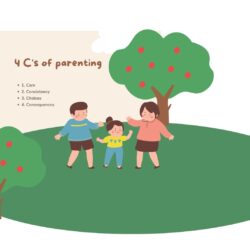As parents, we face many challenges in raising our children, and one of the most significant is teaching them to eat healthily. Good nutrition is not just about providing food but about investing in a lifelong understanding of the importance of healthy eating. In this article, we will explore the essential aspects of parenting and nutrition that contribute to promoting healthy eating habits for children. We will focus on what parents can do to help their children develop healthy attitudes towards food.
Early Influences: The Foundation of Healthy Eating Habits
The journey to instill healthy eating habits in children begins during their early years. This period is crucial for establishing a strong foundation that will impact their dietary choices throughout their lives.
Role Modeling
Children are like sponges, absorbing everything they see and hear. Therefore, as parents, we need to be mindful of our eating habits. By modeling healthy eating ourselves, we set a powerful example for our children. If they observe us enjoying a variety of fruits, vegetables, and whole grains, they are more likely to follow suit.
Family Meals
Family meals have a profound influence on children’s eating habits. Eating together not only fosters a sense of togetherness but also provides an opportunity to introduce them to different foods. Research has shown that children who regularly share family meals tend to have a more balanced diet and are less likely to develop unhealthy eating patterns.
Food Choices
In the early years, parents are primarily responsible for the food choices available at home. By stocking the kitchen with nutritious options and minimizing the presence of unhealthy, processed foods, parents can shape their children’s preferences. Offer a variety of fruits, vegetables, lean proteins, and whole grains, and let your child explore different flavors and textures.
The Balancing Act: Encouragement vs. Control
Promoting healthy eating habits in children is not about strict control but about striking a balance between guidance and allowing them to make choices. Here are some strategies for finding that balance:
Positive Reinforcement
Encouragement and positive reinforcement can go a long way in nurturing healthy eating habits. Praise your child when they make good food choices or try new foods. Highlight the benefits of healthy eating, such as increased energy, stronger immunity, and better overall health.
Involvement
Involving your child in the meal preparation process can be a fun and educational experience. Let them help with age-appropriate tasks, such as washing vegetables, stirring, or even creating their simple recipes. When children have a hand in preparing their meals, they often become more excited about eating them.
Avoid Pressure
Avoid pressuring your child to eat specific foods or finish everything on their plate. It can create a negative association with mealtimes and food. Instead, offer a variety of options and allow them to choose what and how much they want to eat.
Educating Through Experience
Educating children about the importance of nutrition is an integral part of fostering healthy eating habits. However, the key is to make this education engaging and relatable to their daily lives.
Food Groups and Their Benefits
Teach children about different food groups and their benefits. Explain that fruits and vegetables provide essential vitamins and minerals, while proteins help build strong muscles. Use simple, age-appropriate language to help them understand the role each food group plays in their overall health.
Food Labels and Ingredients
As children grow, introduce them to food labels and ingredients. Show them how to read labels and understand the nutritional content of the foods they eat. Encourage them to look for whole, unprocessed foods and to be aware of added sugars and unhealthy fats.
Cooking and Meal Planning
Cooking with your child and involving them in meal planning can be an excellent way to educate them about food. Discuss portion sizes, the importance of balanced meals, and how to create a colorful plate filled with different food groups.
Handling Picky Eaters
Most parents have to deal with picky eaters at some point. While it can be frustrating, it’s important to approach this challenge with patience and understanding.
Offering Choices
Provide your child with choices within healthy options. For example, ask if they would like broccoli or green beans with their dinner. This allows them to have some control over their meals while still making nutritious choices.
Repeated Exposure
Research shows that it can take multiple exposures to a new food before a child develops a preference for it. Don’t give up if your child initially refuses a particular food. Continue to offer it in different ways, and they may eventually develop a taste for it.
Stay Calm and Positive
It’s essential to remain calm and positive when dealing with picky eaters. Avoid power struggles and don’t use food as a form of punishment. Remember that it’s a phase for many children and that with time and patience, their eating habits may change.
The Influence of Marketing and Peer Pressure
In today’s digital age, children are bombarded with marketing messages promoting unhealthy foods. Peer pressure can also play a significant role in shaping their eating habits. As parents, it’s important to address these external influences.
Media Literacy
Teach your child to be media literate. Explain how advertisements are designed to make unhealthy foods look appealing and that they should be critical of what they see on TV and online. Encourage them to ask questions and think critically about the information they encounter.
Setting Guidelines
Establish guidelines for screen time and online activities, ensuring that they have a healthy balance between physical activities and outdoor play. Limit exposure to commercials that promote unhealthy foods.
Peer Conversations
Encourage open conversations about peer pressure and the importance of making their own choices. Help them understand that it’s okay to say no to unhealthy foods or habits if they don’t align with their values and the healthy habits you are promoting at home.
The Role of Schools and Communities
Parents are not the only influencers in a child’s life when it comes to nutrition. Schools and communities also play a vital role in shaping eating habits.
School Nutrition Programs
Advocate for healthy school nutrition programs that provide children with access to balanced and nutritious meals. These programs can reinforce the importance of healthy eating beyond the home.
Community Gardens
Engage in community gardening projects that allow children to see how food is grown and understand the connection between the earth and their plates. These hands-on experiences can foster a deeper appreciation for fresh, locally grown foods.
Peer Support
Connect with other parents and form support networks to share ideas and strategies for promoting healthy eating. These networks can also serve as a source of encouragement and advice when faced with challenges.
Addressing Dietary Restrictions and Allergies
Many children have dietary restrictions or food allergies that can add complexity to fostering healthy eating habits. It’s crucial to navigate these challenges while still promoting a positive relationship with food.
Consult a Healthcare Professional
If your child has dietary restrictions or allergies, consult a healthcare professional or a registered dietitian for guidance. They can help you create a meal plan that meets your nutritional needs while avoiding allergens or problem foods.
Promote Inclusivity
Teach your child about inclusivity and respecting the dietary needs of others. It helps them develop empathy and understanding for friends or classmates with food allergies or restrictions.
Creative Cooking
Explore creative cooking techniques and recipes that accommodate dietary restrictions. Cooking together can be a fun way to bond and experiment with new, healthy options.
Staying Consistent
Promoting healthy eating habits in children is an ongoing process that requires patience and consistency. It’s essential to stay committed to these efforts and adapt as your child grows.
Consistency
Maintain a consistent approach to healthy eating. While it’s natural for children to go through phases of pickiness, consistency in providing nutritious options and education is key.
Adapt to Changing Needs
As your child grows and develops, their nutritional needs will change. Be prepared to adapt to these changes, such as increasing portion sizes, introducing new foods, and accommodating their evolving taste preferences.
Lead by Example
Continue to lead by example throughout your child’s development. Your healthy eating habits will continue to be a powerful influence on your choices.
Related: 7 Ways To Improve Gut Health of Kids: A Parent’s Guide
Conclusion
Parenting and nutrition are inseparable when it comes to shaping healthy eating habits in children. The foundation for a lifelong understanding of the importance of nutritious food is laid in the early years, through positive role modeling, family meals, and age-appropriate education. Balancing encouragement and allowing children to make choices is essential, as is handling picky eaters with patience and understanding. Parents should also address external influences like marketing and peer pressure and work with schools and communities to create a supportive environment for healthy eating.
While promoting healthy eating habits in children can be a challenging journey, it is also a rewarding one. The positive impact on a child’s physical and emotional well-being is immeasurable and can lead to a lifelong appreciation for good nutrition. By staying consistent, adapting to changing needs, and leading by example, parents can foster a love for healthy eating that lasts a lifetime, setting their children on a path to a happier and healthier future.





